Marcus Garvey’s Son, Supporters Want Obama Presidential Pardon
By Barrington M. Salmon -Contributing Writer- | Last updated: Aug 23, 2016 - 2:57:34 PMWhat's your opinion on this article?
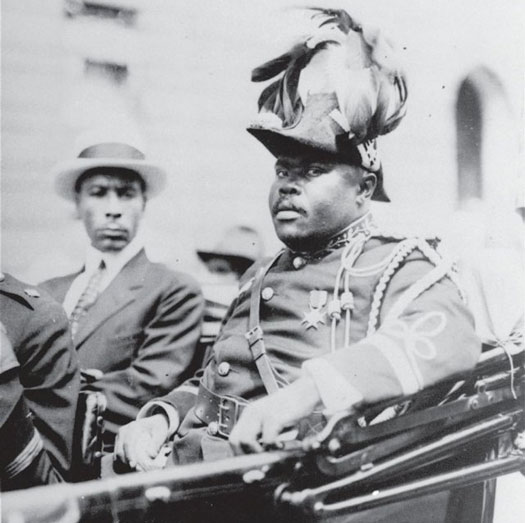
In this Aug. 1922 file photo, Marcus Garvey is shown in a military uniform as the "Provisional President of Africa" during a parade on the opening day of the annual Convention of the Negro Peoples of the World along Lenox Avenue in Harlem, New York.
|
WASHINGTON—More than 90 years ago, the U.S. government, fearful of his considerable influence, railroaded Black Nationalist and Pan African visionary Marcus Mosiah Garvey in a case widely considered to have been racially and politically motivated.
Garvey was a Jamaican-born printer, newspaper editor and businessman who is revered for spending much of his life— through the Universal Negro Improvement Association—working for the upliftment of peoples of African descent around the world over, while promoting economic independence and self-sufficiency as a means of social progress.
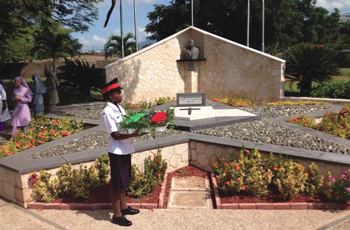
A woman holds wreath at the grave site of the Honorable Marcus Garvey inside of the National Heroes Park located in Kingston, Jamaica.
|
In 1923, a U.S. court tried and convicted Garvey of mail fraud, a conviction that derailed his global movement for racial parity, social advancement and economic independence for Africans all over the Diaspora. President Calvin Coolidge commuted Garvey’s sentence and the government deported him to his homeland in 1927.
On August 17—on Marcus Garvey’s 129th birthday—his son, Dr. Julius Garvey, held a press conference at the National Press Club to announce a renewed effort to secure a presidential pardon for his father.
“This was the avenue left open to us, said Dr. Garvey. “We had gone through the legislative route with Congressman John Conyers in 1987 seeking exoneration and Congressman (Charlie) Rangel who has put forth numerous resolutions which have never gone forward. This is Obama’s last term. This was the last opportunity to get something. We seek to get the president to use language that there was no crime committed and that the trial was a travesty because of various political reasons.”
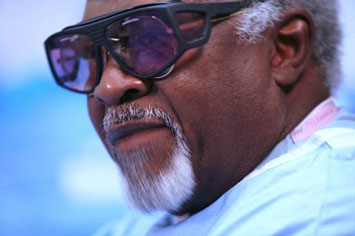
Dr. Julius Garvey, youngest son of prominent Pan- Africanism movement
|
Dr. Garvey, 82, and a surgeon at Long Island Jewish Hospital in New York, said organizers have prepared a petition which has been sent to President Obama’s Pardon Attorney and the president’s attorney. Garvey said he’s aware of the debate among supporters and others in the Diaspora community about the efficacy of choosing to seek exoneration or a pardon for his father who created the UNIA in 1914 which at its height had six million members.
“There’s a very big distinction. Pardon means taking an action out of the goodness of your heart. Exoneration means that the person committed no offense. This was a miscarriage of justice but the U.S. does not have a way in which exoneration can be done posthumously by the president. There can, however be a posthumous pardon.”
A legacy of unity, pride, independence
Jamaican author, publisher and poet Geoffrey Philp is a longtime admirer of Marcus Garvey and has, for the past 10 years, been working to clear his idol’s name. He started a petition in 2011, solicited signatures and sent them to the White House. The petition sought Garvey’s exoneration for the false charges leveled against him.

|
“Why is Garvey important?” Philp asked. “(Caribbean novelist George) Lamming once said until people in the Caribbean and America recognize the contributions of Haiti, we will never be free of the effects of colonial and neo-colonialism. In the same way, New World Africans and Africans on the continent will not be free until we honor and recognize Garvey for setting our minds free.”
Mr. Philp said Garvey, who is an icon for his generation and generations since, spent his life working towards an intellectual and spiritual freedom for Black people. And he used a screenwriting analogy to describe Garvey, an advocate for human and civil rights, racial justice, and a just global economic system.
“In ‘Reading the Way of the Screenwriter’, the author says that on page one of the story you’re telling, the hero is under a spell, doesn’t know he is under the spell, and the story moves the heroine from waking up from that spell,” Philp explained. “The break in the spell happens at the climax and the hero recognizes who he is and walks towards life or death.”
“We have been put under this spell by slavery and colonialism and people like Kamau Brathwaite, Walter Rodney, Marley, and Garvey have been working a kind of magic to get us to wake up. We’re drifting through life looking at life through the eyes of the oppressor.”
That spell manifests itself in often destructive ways, such as the violence Black people inflict on each other, Black and Brown people bleaching their skin and straightening their hair, and despite Black America having the buying power of $1.1 trillion, the vast majority of that money is spent with businesses outside of the Black community.
But in the United States and other countries around the world, there is a psycho-social, cultural and spiritual awakening with young people, and the not so young, seeking a connection to their African past, reaching back to study and learn about important figures like Garvey and embracing African-centered ideas, concepts and values.
“People still just whisper Marcus Garvey’s name, even in Caricom,” Philp said, referring to the Caribbean regional organization that promotes economic integration and cooperation among its 15 members. “Just knowing again how politicians think, they won’t waste political capital pursuing justice for Garvey. They see no efficacy in pursuing it. I ran into politicians like that all the time.”
Mr. Philp said he welcomed Dr. Garvey’s presence and involvement in this latest effort.
“Dr. Garvey is a man who acts very slowly but very deliberately,” said Mr. Philp. “He was just there telling me to go, do it. It is as it should be. He is acting to clear his father’s name. The rest of us are just lovers of Garvey’s work but this is personal. I’m really glad.”
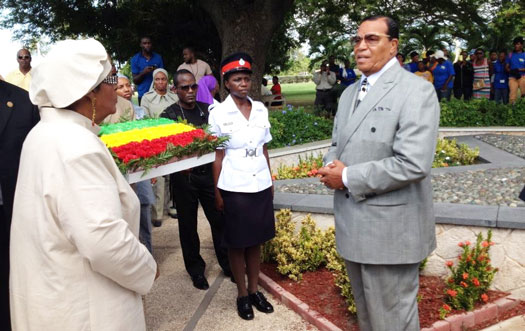
A memorial to the great Pan Africanist leader Marcus Mosiah Garvey stands in National Heroes Park in Kingston. This powerful son of Jamaica launched and presided over one of the largest movements for global Black liberation in history. His Universal Negro Improvement Association spanned several continents and included millions. His rallying cry called for Black self determination, Black cooperative economics, Black pride, strong ties to Africa and repatriation. He called for the Black Man to be a man of Big Affairs, not trifling matters. "One God, One Aim, One Destiny! Africa for Africans at home and abroad." Min. Farrakhan paid tribute to Mr. Garvey during visit to Jamaica.Photos: Richard B. Muhammad
|
Justin Hansford, an assistant professor at the Saint Louis University School of Law wrote a journal article in 2009 titled, “Jailing a Rainbow: The Marcus Case,” arguing that the trial was an effort by the powers-that-be to silence an “outsider.” He argued further that the then-newly discovered evidence suggested that the manipulation of Garvey’s legal narrative by his opponents played a larger role in his conviction than first thought; a role decisive enough to raise concerns of unethical judicial bias and warrant possible exoneration hearings.
Garvey, Hansford noted, was unjustly convicted of mail fraud in 1923, but this injustice was also the culmination of an unholy alliance between Garvey’s political rivals (including bitter adversary W.E.B. DuBois) and Jim Crow-era government officials. Together, the legal narrative they crafted contributed to Garvey’s untimely death (in 1940), tainted his legacy for decades, and helped to misshape the future of the 20th century struggle for racial justice. Hansford acknowledged those scholars who recognize that legal narratives often subordinate the voices of people of color. However, he went a step further by exploring how “unjust legal narratives have served to warp our collective cultural and historical narrative.”
“This larger result has had a powerful impact on the course of political events in our country. In this case, Garvey’s conviction and deportation facilitated the marginalization and silencing of his philosophy of racial justice, a strategy that focused primarily on economic empowerment for people of African descent throughout the world,” said Hansford, a Fulbright Scholar at the University of the Witwatersrand Law School in South Africa.
“As a result of the silencing of this voice, nearly a century later Blacks have obtained the political and social rights favored by Garvey’s rivals, but as a whole still suffer from grave economic disparities worldwide.”
Exoneration and a lasting impact
Dr. Garvey said he continues to be honored and humbled by the enduring power of his father’s message and the ubiquitous influence his thoughts and philosophy continues to engender.
“The global influence is absolutely fantastic,” he said.
“Because of the imprisonment of knowledge, so very few Africans understand the extent to which he changed global politics. He was a forerunner of Civil Rights movement that came out of Marcus Garvey’s thinking. He influenced Martin Luther King and Malcolm X said freedom movements in the U.S. and every free nation in the Caribbean and Africa owe a great debt to him. Jomo Kenyatta called himself a Garveyite, Kwame Nkrumah said it was the spark that allowed him to be who he was, the African National Congress and Namibia’s Sam Njomo got his understanding and philosophy from the Negro World,” explained Dr. Garvey.
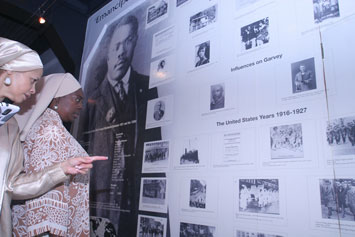
Muslims read about history, legacy of Marcus Garvey in Jamaica.
|
“Kenyatta said that when the Kenyan people got the Negro World, they would gather round to read it, then runners would memorize it and travel across the country to share what they had read. Marcus Garvey had a wide and enormous influence but the former colonizers wrote the textbooks and don’t want to give my father the credit he deserves.”
Garvey espoused a fairly comprehensive economic plan for the development of industries and private businesses, all in Black hands. Following World War I in 1918, conditions afflicting Black people in the U.S. including segregation, violence against Blacks and the Southern migration North, provided the ground in which the Garveyite philosophy flourished. Garvey’s economic line of attack, publicized in his paper, the Negro World, pulled in large numbers of new adherents.
He organized several business enterprises, including the Black Star Line, a fleet of ships, a chain of grocery stores, a restaurant, the Negro Factories Corporation, millinery, and a publishing house. Garvey had hoped the Black Star Line would be a means to trade globally and transport Black people who sought to be repatriated to Africa. He sold shares for $5 and that capital allowed him to buy three ships.
Nation of Islam Minister Louis Farrakhan, whose mother was from St. Kitts and whose father was from Jamaica, highly respects Marcus Garvey and has spoken of the leader’s influence and impact on his life. The guiding principle formulated by Mr. Garvey of Black economic independence mirrors the “Do For Self” and “Economic Blueprint” established by the Muslim leader’s teacher, the Honorable Elijah Muhammad, patriarch of the Nation of Islam.
“The Honorable Marcus Garvey, one of the greatest leaders of our time, knew and was concerned about the future. He was not a man looking only for his own greatness, but he understood that his people were great. In order for his idea to gradually take root among the people, that idea had to be fed to others who would wrap their being around that idea. Then, when his physical presence was no longer there, the idea that made Marcus Garvey who he was, and is, would live,” said Min. Farrakhan speaking about the Black Nationalist leader.
In 2014 thousands of members of the Nation of Islam came to Kingston, Jamaica in commemoration of the Holy Day of Atonement and 18th anniversary of the Million Man March. The Minister and his delegation visited the gravesite of Mr. Garvey to pay honor and respect to the legacy of a man who fought for the dignity and freedom of his people.
It is that leap from the theoretical to the practical and tangible enacted by Mr. Garvey that so impresses admirers like James Fleming. “Imagine Africans and people of African descent in the 1900s trying to navigate a colonial world, to be tested and pushed,” said Fleming, a federal government employee. “Garvey was somebody who was prepared to organize and do real, tangible stuff. We’ve always had people who can touch a cultural chord but it’s something else to build the bricks and mortar of an organization. It’s fine to talk that talk. But to take that brilliance and make it a building, an institution doing the work, the hard work. Having tried to build institutions in the Caribbean, that’s a hard thing,” he added.
“I (have a) deep admiration for Garvey. Once you hear those types of voices though, there’s always a move to pull them down. With regards to the pardon, I think they were trumped up charges anyway,” said Fleming.
“Because of the kind of impact that he had on the development of consciousness of African people in U.S. and because he was the forerunner to the Civil Rights and other movements, I would support a pardon. He developed people’s consciousness and self-esteem and powered people to stand up. He provided the green shoot to civil rights, entire professions.”
(Final Call staff contributed to this report.)
INSIDE STORIES AND REVIEWS
-
-
About Harriett ... and the Negro Hollywood Road Show
By Rabiah Muhammad, Guest Columnist » Full Story -
Skepticism greets Jay-Z, NFL talk of inspiring change
By Bryan 18X Crawford and Richard B. Muhammad The Final Call Newspaper @TheFinalCall » Full Story -
The painful problem of Black girls and suicide
By Charlene Muhammad -National Correspondent- » Full Story -
Exploitation of Innocence - Report: Perceptions, policies hurting Black girls
By Charlene Muhammad -National Correspondent- » Full Story -
Big Ballin: Big ideas fuel a father’s Big Baller Brand and brash business sense
By Bryan Crawford -Contributing Writer- » Full Story






 Click Here Stay Connected!
Click Here Stay Connected!








